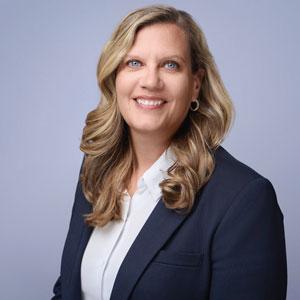
Centerspace (NYSE: CSR) President and CEO Anne Olson, marking her one-year anniversary as head of the residential REIT, views its solid financial performance and smooth leadership transition as key markers of success. As she looks ahead, Olson says the company is positioned for continued growth through enhancing scale in existing markets, or entering new ones, once market activity picks up.
Part of Olson’s transition was likely eased by the fact that she was not a newcomer. She joined Centerspace as general counsel in 2017 and then spent five years in the role of COO before being named CEO in April 2023.
Under Olson, Centerspace has kept the company’s entire senior team and most of its director-level and above team in place. “We get financial results through people. So, we were able to keep our team and our culture intact and deliver on our financial projections in this first year,” Olson says.
Founded in 1970, Centerspace currently owns 70 apartment communities consisting of 12,883 homes in the Midwest and Mountain West region. REIT.com recently talked with Olson about how she has navigated the past year, and what’s ahead in her longer-term vision for the company.
Your entry point into real estate was as a real estate attorney. Can you describe your path into real estate, and how a legal background may have helped get you where you are today?
I grew up on a farm where there was always something to do with real estate. I frequently sat around the dinner table with my dad and his attorney as they talked about things like easements, or acquiring new property, or rent on land that my dad was farming. It was natural for me to go into real estate.

Law school really focuses on thinking: how you identify issues; how you might make a path for strategic execution; and how to get a good result that you and your client desire. From there it was a pretty natural transition into the business side.
In an executive role, you’re thinking about how to identify what the issues are, what do you want to accomplish long term, and how to create a path to get there. That law school background has really helped me navigate how to execute on a long-term strategic plan.
Centerspace reported year-over-year (YOY) core FFO per share growth of 7.9% for the 12 months ending Dec. 31, 2023, along with YOY same-store NOI growth of 9%. How did you achieve that growth?
Our market exposure was a primary contributor to our great financial results for 2023. We're based primarily in the Midwest and Mountain West, which is differentiated from most other public multifamily companies. We didn't have the supply pressure that a lot of people saw and talked about in the multifamily industry during 2023. Our portfolio was a little bit more resilient, and our markets held up really well from a fundamental standpoint, and that really is what drove the financial results.
What would you say were the biggest challenges over the last year?
I had been the COO for five years prior and so was much more involved on a day-to-day operational level in planning and execution of new initiatives. The biggest challenge for me was stepping back a little bit and finding out how to leverage the team into those roles, and making time for some of the things that take up the CEO's time, like the investor side of the business or spending more time with our board on strategy and vision. Spending less time on day-to-day was difficult to give up.
When you were named CEO, Board Chairman John Schissel said you were the “clear choice” to lead Centerspace in its next chapter. What is your vision for that next chapter?
My long-term vision for the company is really to provide a differentiated multifamily offering to public investors that we can scale over time. We're relatively small now, but we can scale by keeping a disciplined focus on operations, market exposures, and our balance sheet.

What are some of your near-term strategic initiatives or priorities?
Like a lot of multifamily companies, we're really focused on optimizing technology so that we can streamline some of our operations. Potentially, we could centralize some of our positions to allow more flexibility in our staffing models and really leverage that technology to help us defend against continued tight labor markets, continued inflation for materials, insurance costs, and things like that.
When you talk about optimizing technology, I have to ask if Centerspace has its own chatbot that gets mistaken for a person?
We do use chatbots, but what is even more effective for us is a true AI product where it connects real-time via text message or email with prospective residents. We do see that residents sometimes show up to their appointments looking for our AI assistant, named Riley. Riley also gets some reviews online, mostly with positive stars, as well as thank you notes in the mail.
During 2023, Centerspace sold 13 communities and in early 2024 sold two additional properties that were under contract. What was your strategy behind those dispositions?
We're constantly focused on making sure we have the best portfolio that we can to position ourselves for future growth, alongside the right market exposures. The overarching strategy behind the recent dispositions is to reduce the amount of older, slow growth, low rent product that we had in the portfolio, as well as pare back some of the exposure that we had across North Dakota. The state tends to have smaller markets and not as many market fundamentals in its favor, such as population, job, and income growth.
We don't currently have anything on our disposition list for the remainder of this year. Our focus has been on how we can recycle that capital from the lower performing assets in our portfolio into the new markets we want to enter, and/or other new investments.

How have you recycled the capital raised from those sales?
A couple of ways. We acquired property in a new market in Fort Collins, Colorado, which is really an expansion of our presence in Denver. We acquired some of our own stock, given that we're trading at a fairly significant discount to our consensus NAV. On a cap rate basis, we were able to sell assets at a lower capitalization rate than we were able to buy our own stock back.
We also recently invested in a preferred financing vehicle for a new development in Minneapolis-St. Paul. We are providing capital for the developer on a preferred basis with an option to purchase it upon stabilization. So, we’re doing a couple of different things to make sure we get the best possible return from those sales proceeds.
What's your pipeline for growth specifically related to new development projects or acquisitions?
Unfortunately, very little. There continues to be a real dearth of transactions in the market. For what product does become available, there's still a very large disconnect between what a seller wants to achieve and what a buyer is willing to pay, as well as volatility and uncertainty surrounding interest rates. So, besides recently investing in that preferred financing, we really don't have anything on the drawing board for this year. However, we're optimistic that during the second half of the year we may see some pick up in volume that will provide us with some opportunities.
What do you see as the biggest opportunities and challenges for Centerspace in the coming year?
I think the largest challenge is just going to be whether the transaction market picks up. Part of having a healthy real estate company is the ability to buy and sell and having some liquidity to change your portfolio and take advantage of opportunities to grow. We really haven't seen much transaction activity at all.
The big opportunity that we have is that we’re well-capitalized and we have a very flexible balance sheet. So, when those opportunities come, we should be able to move quickly and capitalize on them to either enhance our scale in markets that we're currently in, where we're interested in growing, or enter a new market.
There was an interesting study recently showing that female CEOs leading Fortune 500 companies have shorter tenures than male CEOs at 4.5 years versus 7.2 years respectively. How are you approaching the job to prove that trend wrong outside of the Fortune 500?
My long-term view of the company is definitely more than 4.5 years, and it's more than 7.5 years, it's really 10-plus years. I’m planning for a longer-term future, and to the extent that the board and I are able to stay aligned on what that long-term vision is, and we're able to make progress towards it, hopefully, I'll have a good long tenure here.

What advice do you have for other women who are aiming for a C-suite position within the REIT industry?
Try to learn as much as you can and really push yourself outside of your comfort zone to find ways to add value in a way that is measurable. You need to show in real numbers, or progress with metrics, what it is that you can do for the company. Oftentimes, that requires a lot of learning and being open to learn. Also, never underestimate the value of just the necessity to be a leader and how important leadership is in these C-suite roles. Companies don't work on spreadsheets. You have to get results through people.
What’s your view of the progress women have made in gaining seats on REIT boards?
I think the progress that has been made is really great. I sit on another REIT board that is majority female, CareTrust REIT, Inc. (NYSE:CTRE), but I think the focus can't just be on gender diversity, it really needs to be on overall diversity, including race and ethnicity, and mostly on experience and perspective.
One of the things that gender diversity brings is that women and men have different approaches, different perspectives. They certainly have lived different experiences getting to the point of being qualified for that board seat. All of the diversity of opinions and experience and perspectives, that's really what can combine to provide the best return for the shareholders and the best representation of the shareholders.
I believe just under 50% of board appointments last year were females or people of color. But it's still a pretty low percentage overall. We would have to continue on a path of ensuring that number is close to 50% for a very long time for it to actually reach 50%.
Broadly speaking, though, I am really encouraged by the focus that boards have placed on not only bringing diversity to their boards, but also board refreshment overall and making sure that as companies grow and change, that they have the board members with the skills and qualities that they really need to support management teams and the companies overall.

